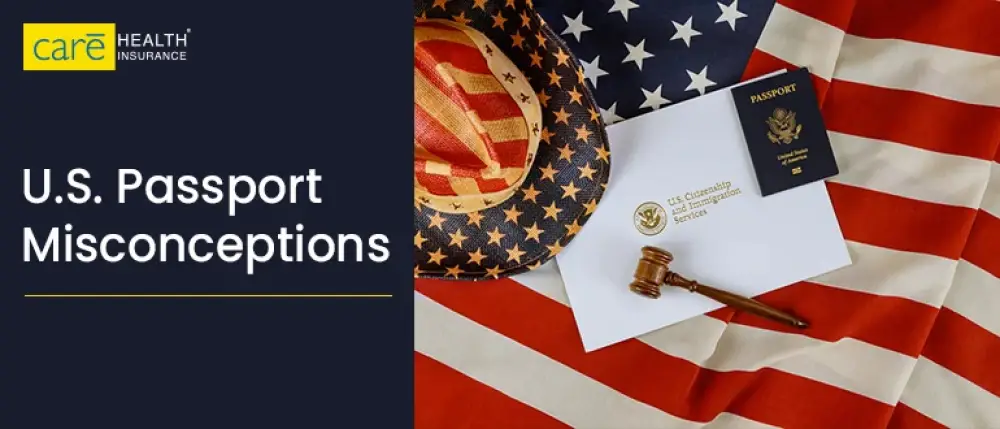Ready to chat about international travel?
There is one thing that tops every traveller’s checklist: a passport. And when it comes to global access, the U.S. passport is considered the golden ticket.
But is it really that simple? Or are there a few myths hiding behind that navy-blue cover?
Let’s explore U.S. passport misconceptions and clear the confusion with real facts.
Facts Behind The Most Common Passport Myths
Here are 10 U.S. passport myths debunked with the real facts. Avoid these misconceptions for smart travel. Take a look!
U.S. Passport Guarantees Entry into Any Country
Myth: One of the most common American passport myths is that holding a U.S. passport allows you to cross any border anywhere in the world.
Truth: While U.S. passports allow visa-free or visa-on-arrival entry to many countries, there are also exceptions. Some countries, including China, Russia, and India, still require prior visas or special permissions and reserve the right to deny entry for valid reasons.
You Only Need a Passport for International Travel
Myth: You only need to travel internationally.
Truth: It is one of the common misunderstandings about U.S. travel documents. However, the reality is that you may need proof of onward travel, such as hotel reservations, travel insurance, or even proof of vaccinations, like those for COVID-19. A passport is just one of the many documents you will need for international travel.
U.S. Passport Expiration Rules
Myth: One of the most surprising U.S. passport misconceptions is that you can use your passport till its expiration.
Truth: The truth about the U.S. passport renewal myths is that some countries may deny your entry if the passport is valid for only a few remaining months. Countries require a passport with long-term validity.
You Can Travel Internationally Without a Passport if You Have a Passport Card
Myth: Passport cards can be used for international travel if you are a U.S. citizen.
Truth: One of the common misunderstandings about passport strength is that it is one of the common misunderstandings about passport strength. The fact is that passport cards are only valid for land travel and sea travel to some countries, including Canada, Mexico, the Caribbean, and Bermuda.
Passports Are Only for Adults
Myth: One of the most common U.S. travel document misunderstandings is that children don’t need a passport.
Truth: If you are taking an international flight with your kids, even an infant, you absolutely need to have their own passports. Children under 16 can apply in person, accompanied by both parents or a guardian, for a passport. Additionally, a child's passport will be valid for only 5 years.
A Slightly Bent Passport Is Fine
Myth: A Damaged U.S. passport is not a problem at all! One of the most commonly heard U.S. passport misconceptions.
Truth: According to U.S. passport facts, if your passport is torn, faded, damaged, bent, or has a missing page, you may be turned away at the airport. So, it's better to get it replaced before travelling.
You Can Get a Rush Passport Anytime for Free
Myth: In the case of an emergency, you can get an instant passport on the same day.
Truth: Only in a life-or-death situation can the U.S. Department of State issue a limited-validity passport. It is valid for up to one year and can’t be renewed. In the case of other emergencies, it will take around 7-10 weeks of processing time to get a U.S. passport.
A Lost Passport Abroad
Myth: If you lose your passport abroad, you will be stuck forever in a foreign country.
Truth: If you immediately report the loss of your passport, you can get emergency assistance at embassies and consulates. After thoroughly verifying your identity and citizenship, they issue temporary passports or travel documents in just a few days.
Tip: It is always a good idea to keep a copy of your passport and other important documents for safety purposes.
Special Protection with the U.S. Passport
Myth: If you have a U.S passport in your pocket, you will get special treatment abroad.
Truth: Debunking these myths is important. A passport is a legal document to prove your citizenship. If you break local laws or commit any crime, then you can be charged or arrested even with a U.S passport in hand. It's just that you can be granted limited help from the U.S. Embassy. Consular officers can provide limited assistance but cannot intervene in local law enforcement.
Dual Citizenship and a U.S. passport
Myth: In the case of dual citizenship, you can only use your U.S. passport, which is one of the common misunderstandings about passport strength.
Truth: If you are travelling to or from the United States, it is best to use your U.S. passport. But, in case of travelling to any other country, you can use whichever passport is more helpful, and it is completely legal.
U.S. Passport Facts vs Fictions - Myths Busted!
A passport is way more than just a booklet; it's a golden ticket for global access. These U.S. passport misconceptions and real facts will allow you to travel smart and avoid surprises during your international trip. Before embarking on your next adventure, double-check your passport for expiry, any damage, or other stamps to ensure you can travel internationally.
>> Also Read: Strongest Passports in the World
Disclaimer: Plan features, benefits, coverage, and claims underwriting are subject to policy terms and conditions. Kindly refer to the brochure, sales prospectus, and policy documents carefully.
